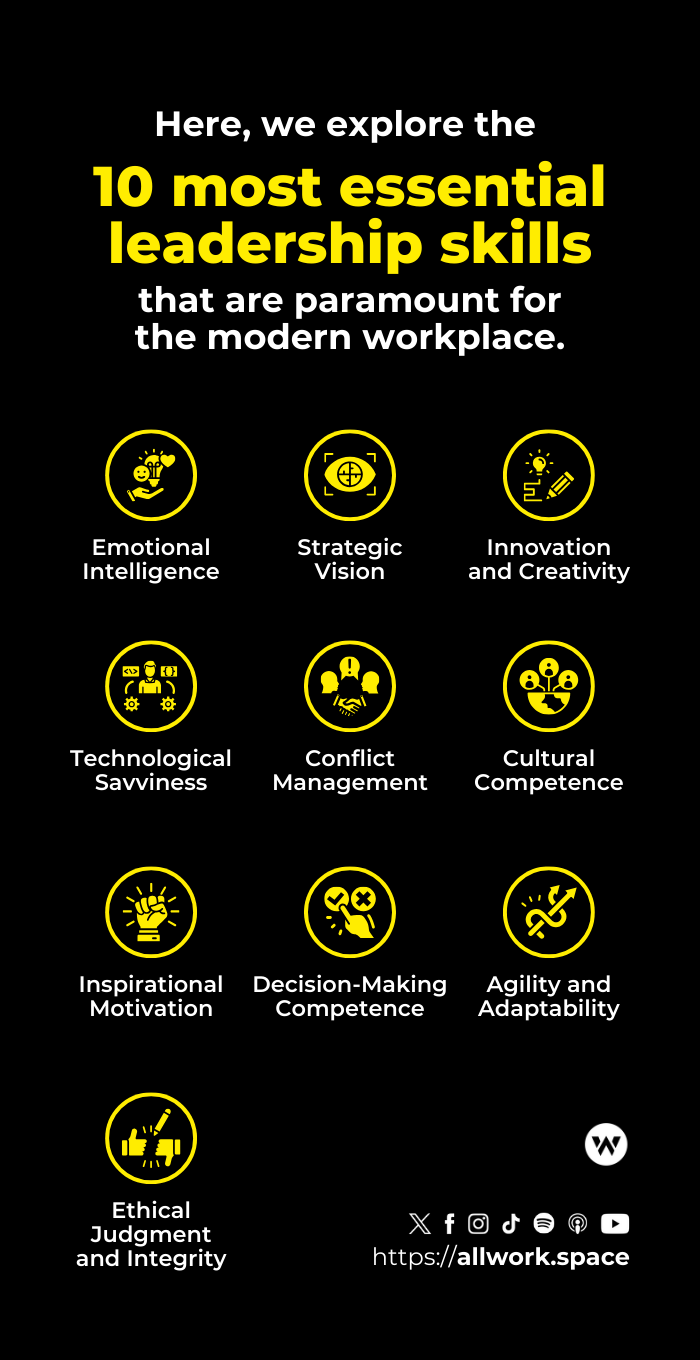- Post-pandemic, many companies have shifted into a hybrid model or returned to the office completely — both of which require sets of team management skills that are often new, or, at best, untested in novel workforce arrangements.
- Today’s leaders are not just expected to guide their teams towards achieving goals, but also need to inspire, innovate, and navigate through an ever-changing business landscape.
- Many leaders are struggling to adapt to dramatic, rapid digital transformations and cultural shifts, while they are also expected to thrive to become a strong example for their employees.
Leadership, a multifaceted construct in the organizational context, has evolved significantly over the years. Today’s leaders are not just expected to guide their teams towards achieving goals, but also need to inspire, innovate, and navigate through an ever-changing business landscape. Many leaders are struggling to adapt to dramatic, rapid digital transformations and cultural shifts, while they are also expected to thrive to become a strong example for their employees. It’s a big responsibility.
Beyond that, the basics of the modern workplace have transformed dramatically. Moving past pandemic-fueled remote setups, many companies have shifted into a hybrid model or returned to the office completely — both of which require sets of team management skills that are often new, or, at best, untested in novel workforce arrangements. Which leadership skills are most effective in remote or hybrid teams?
How can you fairly manage a team when four of them are next to you in the office and seven others are scattered across time zones? What do you do with an office full of people who are grumpy all day simply because they have to be there in the first place? Is there really any good way to comfort people who are afraid of losing their jobs after a round of job cuts?
These are tough questions for any manager, and they require modern leadership strategies that move beyond traditional training. Here, we explore the ten most essential leadership skills that are paramount for the modern workplace.
1.Emotional Intelligence
Emotional intelligence sits at the core of effective leadership qualities. It involves the ability to understand and manage one’s emotions and the emotions of others. Leaders with high emotional intelligence can foster strong relationships, enhance team cohesion, and effectively navigate conflicts. They are adept at empathy, allowing them to connect with team members on a personal level, which is vital for nurturing a supportive and collaborative work environment. By cultivating trust and respect, leaders can create a collaborative atmosphere where everyone feels valued and invested in the company’s success.
2.Strategic Vision
There is no way to effectively lead a team to success if you don’t know where you are going.
The ability to think strategically is an indispensable leadership skill. It entails the ability to see the big picture, set long-term objectives, and devise actionable plans to achieve them. Effective leaders are visionaries who can anticipate future trends and prepare their organizations accordingly. They understand how different aspects of the business interconnect and can make informed decisions that align with the company’s overarching goals.
Strategic planning needs to start with determining your organization’s core values. These guide decision-making, how the company interacts with customers and the community, and the culture of the organization overall. Develop these by brainstorming with internal and external stakeholders, and make sure to consider everyone involved.
3.Innovation and Creativity
Innovation is the fuel for growth and competitiveness. Leaders should encourage a culture of creativity, where team members are empowered to think outside the box and explore new possibilities. Embracing innovative thinking can lead to breakthroughs that propel the business forward.
4.Technological Savviness
In an era where technology is integral to nearly all business operations, leaders must be technologically savvy. This doesn’t mean they need to be IT experts, but they should have a solid understanding of the technological tools and platforms that can benefit their organization. Keeping abreast of tech trends can also offer competitive advantages and open up new opportunities for innovation.
5.Conflict Management
Disagreements and conflicts are inevitable in any workplace. Leaders must possess the skills to manage conflicts constructively, facilitating resolutions that respect all parties’ perspectives. By addressing issues promptly and fairly, leaders maintain harmony and prevent disruptions to productivity.
Negotiation skills are another important component of this. Effective negotiation involves understanding the needs of all involved, finding common ground, and crafting solutions that can have a lasting impact.
6.Cultural Competence
The modern workplace is increasingly diverse, and leaders must possess cultural competence to manage this diversity effectively. This means having an awareness of different cultural practices and sensitivities, and being able to navigate cross-cultural communications tactfully. Leaders who embrace diversity can harness a range of perspectives and experiences, leading to more innovative solutions and a more inclusive work environment.
7.Inspirational Motivation
Leadership is as much about inspiring others as it is about managing tasks. Inspirational motivation refers to the ability to energize and motivate team members to go above and beyond. Understanding what drives each team member is crucial for effective leadership. Leaders should strive to recognize their achievements and provide opportunities for professional growth. A motivated workforce is more engaged, productive, and committed to the company’s objectives.
Leaders who can articulate a compelling vision and demonstrate passion for their work can ignite enthusiasm in their team. This drive can lead to increased productivity and a positive workplace atmosphere.
8.Decision-Making Competence
Leaders are often faced with complex decisions that can impact the entire organization. Effective leadership requires the ability to analyze situations, weigh options, and make informed choices. Decisiveness instills confidence in the team and ensures that the business can navigate through challenges with clarity and purpose.
This skill requires confidence, analytical thinking, and sometimes, the courage to take calculated risks. Good decision-making also involves transparency and accountability, as leaders must stand by their choices and learn from outcomes.
9.Agility and Adaptability
The modern business landscape is characterized by rapid change and unpredictability. Leaders must be agile, able to pivot strategies swiftly in response to market shifts, internal challenges and even global crisis. Adaptability also means being open to new ideas and approaches, staying ahead of industry trends, and being prepared to lead through uncertainty.
10.Ethical Judgment and Integrity
Finally, leaders must exemplify ethical judgment and integrity. This includes being honest, fair, and principled in all dealings. In today’s climate of increased transparency and social responsibility, leaders’ actions are closely scrutinized. Upholding high ethical standards is essential for maintaining credibility and trust, both within the organization and with external stakeholders.
How can leadership skills be developed in the workplace?
To cultivate these essential leadership skills, ongoing development is key. Leaders should seek out training programs, mentorship opportunities, and practical experiences that challenge them to grow. They should also be reflective, continuously assessing their strengths and areas for improvement.
The modern workplace demands a new breed of leaders—ones who are equipped with a diverse set of skills to navigate the complexities of today’s business world. By focusing on developing these skills, leaders can build resilient, innovative, and high-performing teams. As we look to the future of work, investing in these skills will not only prepare leaders for the challenges ahead, but also position their businesses for sustained success.


















